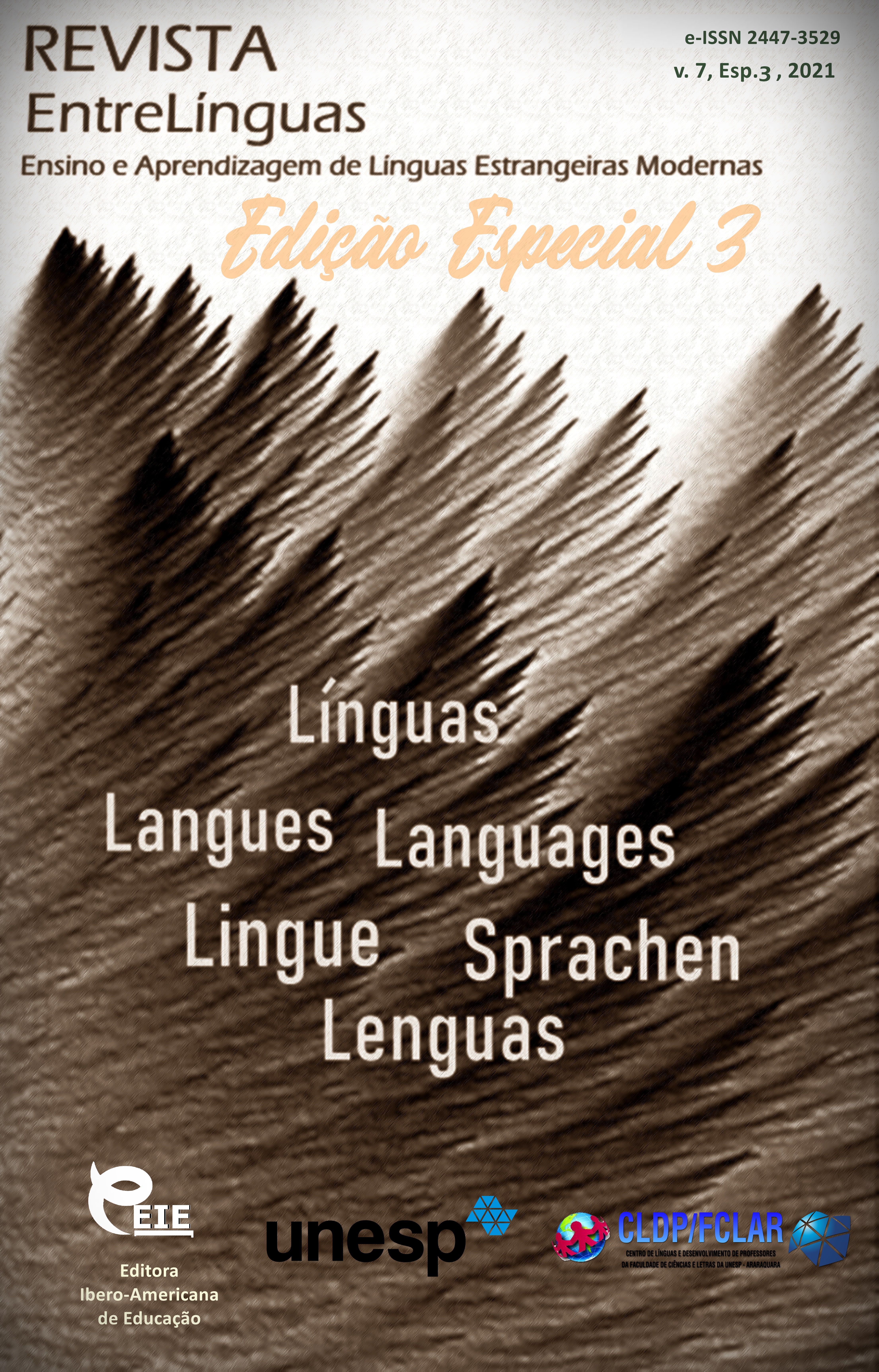Neologisms in socio-political discourse of the modern french language
DOI:
https://doi.org/10.29051/el.v7iesp.3.15713Keywords:
Language, Linguistics, Discourse, Media, Neology, Affixation, Composite word formation, French languageAbstract
The article is devoted to investigation of functional status and structural characteristics of lexical innovations in socio-political discourse of the French language. The research material constitutes explanatory dictionaries of French such as Le Petit Larousse, Le Petit Robert and online versions of periodicals (daily newspapers Le Monde, Le Figaro, weekly magazine Le Nouvel Observateur). Urgency of the research calls forth necessity of accurate definition of the notion “neologism” and consequently theoretical ground of mechanisms of vocabulary neologization on the basis of picked out criteria for its description. The aim of the research is study of mechanisms of activization and functioning of neologisms in socio-political discourse of the French language. It is shown in the article that in spite of active dynamics of vocabulary of modern politics, lexicographical fixation of neologisms is distinguished by sufficient caution by virtue of objective reasons. Particular attention is given to analysis of content plane of lexical units taken from explanatory dictionaries of French. The most productive ways of formation of lexical neologisms in socio-political sphere of French is reviewed. The novelty of the study is in the involvement of media texts analysis data to discover the main vectors of the modern French language vocabulary development.
Downloads
References
AGEEVA, A. V.; ABDULLINA, L. R.; ARTAMONOVA, E. V. Corpus linguistics tools for loanwords and borrowings studies. Special Issue of Journal of Research in Applied Linguistics, v. 10, p. 468-477, 2019.
AKHMETOVA, L. A. et al. The word-formation category displacement causation: mutational and modification semantics of german, russian and tatar verbs. XLinguae, v. 12, n. 1, p. 21-36, 2019
BOULANGER, J-C. Les dictionnaires et la neologie: le point de vue duconsommateur. In: TERMINOLOGIE ET TECHNOLOGIES NOUVELLES, 1988, Quebec. Actas do […]. Quebec: Gouvernement du Quebec, 1988. p. 291-318.
CLUB D’ORTHIGRAPHE DE GRENOBLE. Mots Nouveaux du Petit Larousse. 2006. Available: https://orthogrenoble.net/mots-nouveaux-dictionnaires/entrees-petit-larousse-2006/2006. Access: 10 Dec. 2020.
CLUB D’ORTHIGRAPHE DE GRENOBLE. Mots Nouveaux du Petit Larousse. 2010. Available: https://orthogrenoble.net/mots-nouveaux-dictionnaires/entrees-petit-larousse-2010/. Access: 10 Dec. 2020.
CLUB D’ORTHIGRAPHE DE GRENOBLE. Mots Nouveaux du Petit Larousse. 2012. Available: https://orthogrenoble.net/mots-nouveaux-dictionnaires/entrees-petit-larousse-2012/. Access: 10 Dec. 2020
CLUB D’ORTHIGRAPHE DE GRENOBLE. Mots Nouveaux du Petit Larousse. 2016. Available: https://orthogrenoble.net/mots-nouveaux-dictionnaires/entrees-petit-larousse-2006/. Access: 10 Dec. 2020.
CLUB D’ORTHIGRAPHE DE GRENOBLE. Mots Nouveaux du Petit Larousse. 2017. Available: https://orthogrenoble.net/mots-nouveaux-dictionnaires/entrees-petit-larousse-2006/. Access: 10 Dec. 2020.
DEPUTATOVA, N. A. et al. Extra-linguistic features of the southern dialect of american english in the novel of harper lee “go set a watchman”. Journal of Educational and Social Research, v. 9, n. 3, p. 117-124, 2019.
GABDREEVA, N. V. Inoyazychnaya leksika v russkom yazyke noveyshem perioda: monographia [Foreign vocabulary in the modern Russian language: a monograph]. Moscow, Flinta, 2019. 328 p.
GAK, V. G. O sovremennoy frantsuzkoy neologii [About modern French neology]. Leningrad: Nauka, 1978. 52 p.
KADLEC, J. Les néologismes en français contemporain centrés sur la presse [Электронный ресурс]. 2015. Available: http://www.theses.cz/id/iiizv7/DP.pdf. Access: 10 Dec. 2020.
LEVIT, Z. N. Leksikologia frantzuskovogo yazyka [French lexicology]. Moscow: Vyshaya shkola, 1979. 160 p.
MASLOVA, G. D. Neologismy v sovrevennom frantzuskom yazyke na materiale suffiksalnykh i prefiksalnykh imen sushchestvitelnykh [Neologisms in modern French on material of suffix and prefix nouns]. Moscow: MOPI 1961. v. СVIII, p. 145-157.
SABLAYROLLES, J-F. Neologisme et nouveaute. Cahiers de Lexicologie, v. LX, p. 5-42, 1996.
SAKHARNYI, L. V. K tainam mysli i slova [To the secrets of thoughts and words]. Moscow: Prosveshchenie, 1983. 159 p.
TAKHTAROVA, S. S.; ABUZYAROVA, D. L.; KUZMINA, O. D. Сommunication between population of germany and german-speaking switzerland: intra- or intercultural communication? Academic Journal of Interdisciplinary Studies, v. 8, n. 2, p. 126-130, 2019.
TVMONDE5. Langue française: les nouveaux mots du Larousse et du Rober. 2015. Available: http://information.tv5monde.com/info/langue-francaise-les-mots-de-l-annee-34004. Access: 10 Dec. 2020.
ZEMSKAYA, E. A. Slovoobrazovanie kak deyatelnost [Word formation as an activity]. Moscow: Komkniga, 2005. 224 p.
Published
How to Cite
Issue
Section
License

This work is licensed under a Creative Commons Attribution-NonCommercial-ShareAlike 4.0 International License.
Os manuscritos aceitos e publicados são de propriedade da Revista EntreLínguas. Os artigos publicados e as referências citadas na Revista EntreLínguas são de inteira responsabilidade de seus autores.
Transferência de direitos autorais – autorização para publicação
Caso o artigo submetido seja aprovado para publicação, já fica acordado que o(s) autor(es) autoriza(m) a UNESP a reproduzi-lo e publicá-lo na EntreLínguas, entendendo-se os termos “reprodução” e “publicação” conforme definição respectivamente dos incisos VI e I do artigo 5° da Lei 9610/98. O artigo poderá ser acessado pela rede mundial de computadores (Internet), sendo permitidas, a título gratuito, a consulta e a reprodução de exemplar do artigo para uso próprio de quem a consulta, desde que haja a citação ao texto consultado. Essa autorização de publicação 328 EntreLínguas, Araraquara, v. 1, n .2, p. 323-328, jul./dez. 2015 não tem limitação de tempo, ficando a UNESP responsável pela manutenção da identificação do(s) autor(es) do artigo. Os artigos publicados e as referências citadas na Revista EntreLínguas são de inteira responsabilidade de seus autores.











